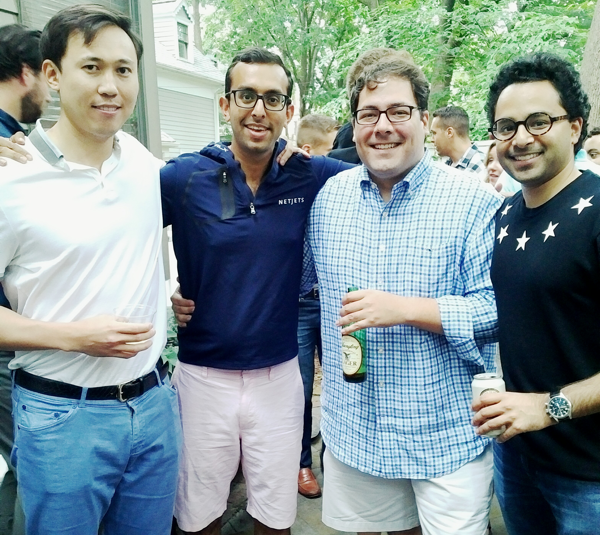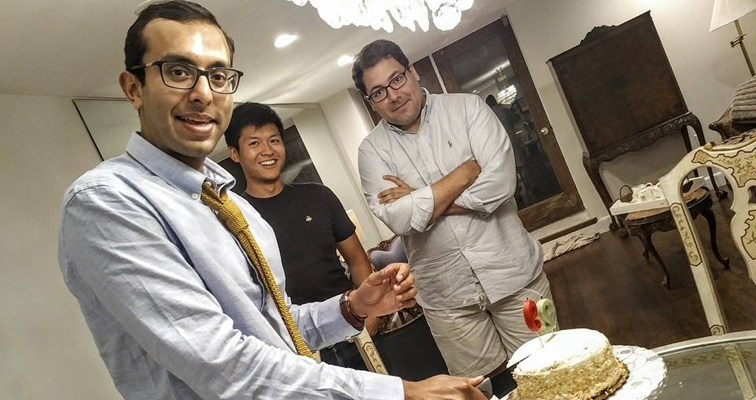Back in 2008, it was uncommon to find a venture firm that focused on early-stage investing. It was even more uncommon for a venture firm to have a college student as its founder. But this is exactly what Krishna Gupta, Romulus Capital's Founder and Managing Partner accomplished.
Today, we take for granted things like Rough Draft Ventures and the Dorm Room Fund, which are student led but with funds that are ultimately supported by larger VC firms. Few students have actually gone on to raise their own fund.
Timing was also interesting for Gupta to start this new fund, since the economic conditions were not ideal in 2008. However, in down times there are opportunities, and it ended up being perfect timing for Gupta, as he was able to fund several great companies. Read more in the interview below.
Keith Cline: Tell me about your background.
Krishna Gupta: I was born and raised in the suburbs of Chicago. My parents came to the U.S. from India in the early 1980s. My mom studied computer science and worked in the telecom industry for Bell Labs, Lucent, and now Nokia.

My dad was an electrical engineer, who was part of the first group to implement six sigma at Motorola. He then started his own consulting firm on helping other companies implement six sigma and later was part of a startup during the internet boom of the ‘90s.
The internet bubble burst in 2000/2001 and I saw firsthand the downside of entrepreneurship and what it does to a family.
However, entrepreneurship was in my blood, through my immediate family and my mother’s family. I remember starting businesses when I was a kid, such as a neighborhood store making crafts. It was gratifying to create something and save profits to share among my “employees”. I remember the first profits we collected, we used to buy a pack of peanut M&Ms from a neighborhood vendor.
I came to the northeast to attend boarding school at Phillips Andover. I chose the school because it was one of the top schools in the country and they had an open ecosystem for learning. It was a place where I could explore my academic interests and passions.
I've always had a love for math and competed in math competitions through middle and high school. I was selected as a finalist for the U.S. math olympiads multiple times and was in the top 50 across the country for my year. It was a lot of fun, but you ultimately have to be in the top six to be selected for the U.S. team that goes to the International Math Olympiads. Since it was essentially impossible that I was going to reach that goal, I started to branch out and explore other interests.
I started honing my writing skills and made a film in England. The filmmaking experience also gave me another crack at entrepreneurship - I had to raise capital from professors on campus - so I could go abroad to make the film.
After Phillips Andover, I attended MIT to return to my science roots and be at a place that was world-class in both engineering and business. I knew I wanted to start a company, and that’s a key reason I chose MIT. I was allowed to take classes with the MBA students along with my engineering classes, which was very rare. I graduated with two degrees: Management Science and Materials Science and Engineering.
KC: What did you do for work as an intern at JPMorgan?
KG: For two summers, I was very fortunate to be the lead analyst on two billion-dollar transactions. During the first summer, after my sophomore year, I worked on Verizon Wireless’ acquisition of Rural Cellular Corporation. The lead analyst on the deal left the firm and they gave the work to me.
When I returned the following summer, they already knew I was capable of handling the work and they assigned me to be a lead analyst for the sale of The Weather Channel to Bain Capital, Blackstone Group, and NBCU.
KC: How did you get into venture capital?
KG: At MIT, I wanted to start a company, and I met a lot of like-minded people with similar ambitions. As I started looking into the ideation/company-building process, I realized there was no one to help build foundations of companies. I noticed that a lot of VC firms were just lottery machines and were good at pattern recognition. They would provide the capital, but they weren’t always involved in the foundation of actually building the business. I found myself working with different student entrepreneurs and thought I could add value to multiple companies as a seed investor.
At that point in time, seed investors were pretty uncommon. There was First Round Capital, Founder Collective, and maybe one or two others. It was especially unusual for someone of my age to start a venture fund back then, too. It took me a year and a half to raise our first fund of $850K. Our initial focus was on companies out of MIT and Harvard.
In parallel, I graduated from MIT a semester early in 2008. I was recruited to work at McKinsey as a strategy consultant. After I signed the offer letter, the financial crisis hit and the world was in a tough place. The firm ended up deferring a bunch of the new hires by six months. Thus, I had 12 months before I was scheduled to start working at McKinsey.
The first six months were spent traveling across the world and raising capital to close out our first fund. The second six months were spent building the foundation for Romulus Capital.
I thought I could balance both jobs in terms of Romulus and McKinsey. I was wrong and had to make a decision. I chose Romulus.
It ended up being great timing. In Boston, it was difficult to find seed investors who could write smaller $40K checks and I was helping to fill a void in the market. Plus, in my opinion, the bottom of the market is the best time for any entrepreneur to start a company. You have to develop a leaner and hungrier mindset, which matches up with our investment philosophy to be conviction driven and not market driven.
KC: What companies are currently in your portfolio?
KG: ClassPass, Cogito, Disruptor Beam, Ginger.io, Placester, Smart Lunches, The Tap Lab, Humanyze, E la Carte, and others.
KC: What stage of investments do you primarily target?
KG: We like to be the first money in for a company, in terms of their seed or Series A round of funding. Our first fund had a mix of B2C and B2B companies.
Our second and now third funds tend to be more B2B focused, with technology companies across a variety of industries such as real estate, healthcare, retail, construction, etc.
KC: What are the top traits you look for in terms of investing into a company or founder?
KG:
- Large market
- Hunger and resilience - I have a hard time working with people who don’t have the same killer instinct
- Engineering backgrounds bias - I tend to like people who are technical
- Team fit between technology and the market
- Sustainable advantage - There is no such thing as first mover advantage anymore. Others will raise money and compete against you, so what will make this company survive over others? Some will succeed based on relationships, others will succeed based on their technology. Take machine learning. It is not a revolutionary concept, but the team that has the deepest experience dealing with a problem will likely win. For example, ginger.io was working on solving a problem for five years before they raised capital from us. They are now 12 years in and no one has the same level of depth and accuracy dealing with data sets for mental health as this team has.

KC: What is the current fund that you are investing from?
KG: We just closed our third fund, which is our largest at $75M.
KC: What excites you about the current market in Boston?
KG: From a talent perspective, it is hard to beat Boston. The talent pool is highly intellectual and there’s an extremely dense amount of world class human capital here working to solve complex problems. The ideas here are adding real value to the world, versus another consumer photo sharing app.
The [Silicon] Valley has a larger amount of talent, but it all feels very commercial. It’s all about deal making and “who is in your round.” Still, there’s a lot Boston can learn from the Valley.
KC: What companies in Boston, outside of your portfolio, do you find interesting?
KG: I’m a fan of Wayfair and several of the cybersecurity companies located here.
KC: Greatest misses. Are there any companies you passed on that you wish you hadn’t?
KG: I don’t think we’ve missed out on anything major yet. The larger companies in the Boston tech scene, like DraftKings, didn’t match up with our investment strategy.
KC: Who do you admire or who has been the greatest mentor for you?
KG: I don’t really have a mentor, although I do admire a lot of people in my industry like John Doerr (Kleiner Perkins Caufield Byers), Michael Moritz (Sequoia Capital), Josh Kopelman (First Round), and Hemant Taneja (General Catalyst).
KC: Outside of being a VC, what are you personal interests or activities?
KG: I am a big sports fan (football, basketball, tennis, and cricket). I have been spoiled, as I watched the Chicago Bulls as a child during the Michael Jordan era, and the Patriots won their first Super Bowl when I moved to Boston and have obviously been on a run since.
I’m also a student of political and military history. I also find the arts a great way to relax and discover.

KC: What was the last book that you read?
KG: The Everything Store: Jeff Bezos and the Age of Amazon
KC: Are you involved in any charitable organizations?
KG: Not yet, however I do think there will be a time when I start my own charity. Perhaps something that would help orphanages. If you think about it, orphans are missing their parents, which is the biggest missing support foundation anyone could have. When you are deprived of something of that magnitude, it drives a hunger that is often times correlated with what makes entrepreneurs successful.
Keith Cline is the founder of VentureFizz. Follow him on Twitter: @kcline6.

